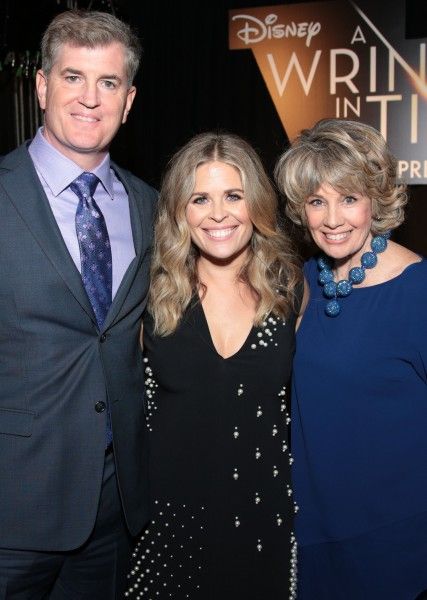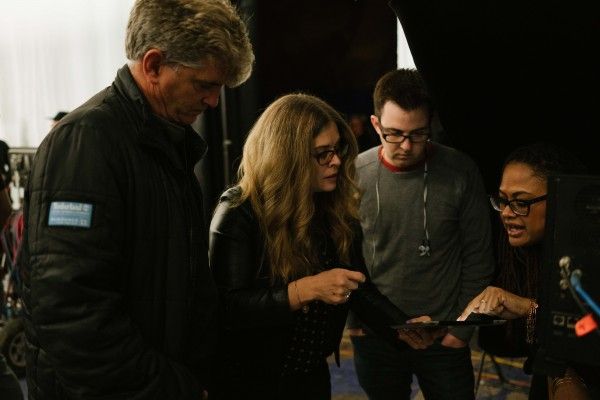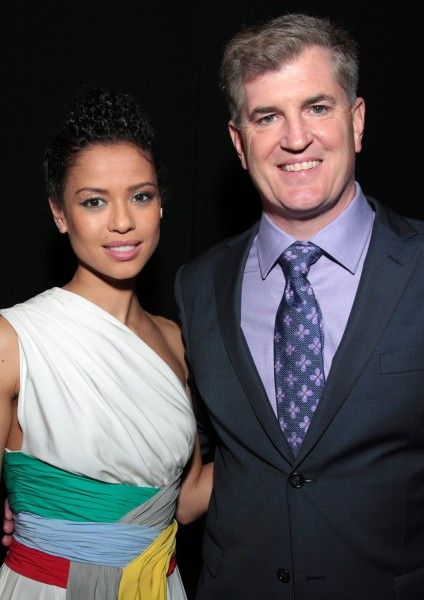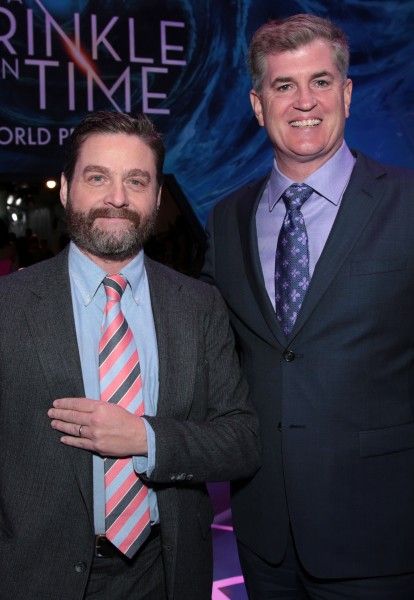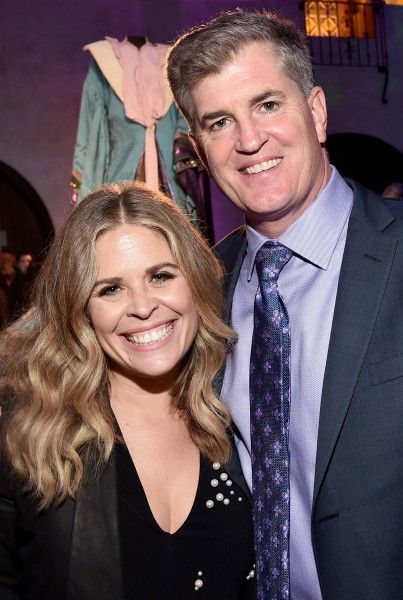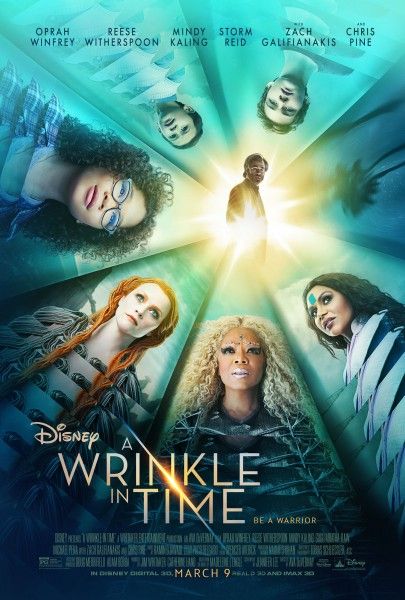From visionary director Ava DuVernay and based on Madeleine L’Engle’s timeless classic, A Wrinkle in Time follows Meg Murry (Storm Reid), as she sets out on a transformative journey to discover that strength comes from embracing one’s flaws and that the light inside us can overcome the darkness around us. Meg is a typical teenager struggling with issues of self-worth, along with the mysterious disappearance of her father, four years ago. Upon learning that her father might still be alive but trapped on another planet, somewhere in the cosmos, Meg sets out on an adventure with her younger brother, Charles Wallace (Deric McCabe), and fellow classmate, Calvin (Levi Miller), to find out if she has the courage it will take to get him back.
At the film’s Los Angeles press junket, Collider got the opportunity to sit down with producer Jim Whitaker to talk about why he wanted to bring A Wrinkle in Time to the big screen, what he most appreciates with the themes in the book, how Ava DuVernay’s leadership was a guiding light throughout the production, the evolution of the adaptation, and why Storm Reid was the perfect actress to place at the film’s emotional center. He also talked about what he looks for in a project, where they’re at with the retelling of Peter Pan from David Lowery (Pete’s Dragon), and how John Waters sparked his desire to become a producer.
Collider: Why was now the right time to bring A Wrinkle in Time to the big screen?
JIM WHITAKER: For me, it was all about Meg and telling the story of this little girl who’s self-actualizing through this journey. It so happens that now might be the right time because it’s a darker time and a time when a movie that’s about lightness could be really great for the world. But it’s really about her and about this idea that we all have the ability to bring the best parts of ourselves to the world, no mater what’s going on. In a certain sense, there’s a timelessness to it, which is why the book has been so enduring. It represents what we all want to be, actually. That’s what really attracted me to it.
You must have read the book more than a few times now.
WHITAKER: I have. It sits right to the right of my computer and it’s just mangled. The pages are turned, and it’s got writing and highlighting all through it. When this is all over, in a couple of months, I’ll flip through it. I know it well.
Since you first read it as a child, are there things that you appreciate about the story now that you maybe didn’t even pick up on when you first read it?
WHITAKER: Yeah. The movie is a children’s movie, as it was a children’s book. The greatest thing will be for kids to go see it and to see it through their eyes. That’s how I read it and we hope that we’ve duplicated that. It’s a wild adventure that you go on, but on a very grounded level, you see this girl go on a journey and there’s also these larger concepts that, at the time I read it, were really powerful to me. When people see it, I think it will resonate with them on a higher level, too. That’s what makes the book so great, and what I think makes the movie great. I appreciate more about the book now because the story is like an onion that just keeps peeling away. I think Ava did a beautiful job, in bringing that to the screen in a cinematic way.
As a producer, getting any movie made seems daunting, but with a movie like this, what were you most nervous about being able to pull off and did anything feel insurmountable?
WHITAKER: Nothing felt insurmountable, in part because of Ava’s leadership. She’s a force of nature. I, and everybody, felt like we were in great hands, under her leadership. The thing I wanted to make sure that we did pull off, which I think we did, was that we never forget the fact that this is ultimately a simple story about a girl who feels different, feels somewhat unloved, and is looking for the best parts of herself, but can’t find them on Earth, and goes on this journey and finds all of that. The emotion of that is what I really cared about. The danger was that, as we went out into the universe and got away from Earth, the planets would take us away from that. I think Ava did a great job of keeping it grounded and keeping it emotional. That’s where the movie lives and that’s where the book live. That’s where it lives for kids, in their hearts. They want to go on this great journey, but they also want to know that, by the end of it, they’re back home on Earth and back with their family, they feel safe, and they feel different, but at the same time, they’ve come to an emotional place that feels good. That was the only thing I worried about, but I didn’t worry, once we started. Right from the very beginning, the first thing that Ava said to us was, “I’m interested in telling the story of a girl who feels different, who goes on a journey and realizes that she is a part of the universe and that the universe is within us.” That was practically the first sentence she said to us and when I heard that, I thought, “We’re gonna be fine,” ‘cause that’s what the movie is.
Ava DuVernay is the first female, as well as the first black female, filmmaker who’s take on a sci-fi/fantasy movie with more than a $100 million budget. What sort of atmosphere and vibe did she create on set? Did you ever feel some of that nervousness, that she had to have, in doing this?
WHITAKER: I never felt it, for one moment. I’ve worked with a lot of great directors, from Ridley Scott to Ron Howard, and I can celebrate her success, being an African American female director, but to me, every day, I went to work with a director that was focused, knew exactly what she wanted, and went for it and got it. What she did that I appreciated, from the very beginning, was that she opened up all of the departments to a conversation about what they wanted to bring to the movie. Everybody felt like they had the ability to bring something of themselves into the movie. That was how we began it. As time went on, as the family that was smaller got bigger and bigger to include actors, she did that with everybody. There was an electric energy that was moving through the making of the movie because everyone would show up to bring their best selves to the movie. She did an incredible job. She’s a very talented director. She knows what she wants, as all great directors do. We just were there to support her getting it. There’s no question that everybody knew she was in charge, but it was done in such a way that they felt like they were showing up to follow that, knowing that they were in the hands of a leader who was going to treat them with a measure of great respect and connection that makes people wanna work harder and be more involved. She did a great job.
From the first script that you read to the movie that we see now, how much did things change?
WHITAKER: Jennifer [Lee] wrote a great first draft. Ava came in and said, “Let’s look at the beginning and make sure it aligns a little more closely to what the beginning of the book is. Then, as we move towards and through the movie, especially through the middle of the movie, let’s just remind ourselves that we don’t have to stay 100% connected to exactly what the book is. We can open ourselves up to the best idea.” As you progress through the book, there are ideas that have, frankly, been copied and have been seen in the world, and she was determined to make sure none of the images we saw have been seen in the world. And yet, at the same time, she didn’t want to sacrifice the spirit of the book. A great deal of what Jen wrote, from the very beginning, remained, but it did change. We were very much of the belief system that the best idea wins, and that was true for the entire movie. If something came up and it felt like the right idea, we went for it.
What do you think Storm Reid brings to the role of Meg Murry that not only made her the perfect actress at the center of this story?
WHITAKER: She feels deeply. She’s a beautifully precise and relaxed actress, and she’s just very talented. That being said, Ava was really spot-on, in knowing that and dialing that in. Together, they worked beautifully. We were constantly seeing her in the degrees of her talent, and she was clearly capable of doing all of it, from the beginning. Once we got on set, I never worried about the movie having an emotional center that wasn’t grounded. All the things that one might worry about, she just had it. She’s really, really talented.
After telling such a big, epic story, where do you go from here? What’s the next thing for you?
WHITAKER: I try to keep it pretty simple. I look for stories that have great characters, that usually involve a sense of hope, and have some underlying message or meaning underneath it. For me, it’s really important to get up, every day, and believe that I have a purpose in what I’m doing and that the things I’m involved in have a purpose, when they get out in the world. I have a very small group of projects that I develop with really talented people, and I try to be patient and not do things that don’t qualify within that realm of what to make. I’ve been fortunate that, throughout my career, I’ve been able to make things where I can say, “Okay, that’s why I made that.” That’s really important to me. So, we’ll see. I learn more, every time. I get better at it. I make mistakes, and when I can learn from them, I keep going.
Are you still working on developing Peter Pan with David Lowery?
WHITAKER: Yeah, I’m still working on that. What’s special for me about that is that I had such a beautiful experience with David Lowery, making Pete’s Dragon and going to New Zealand. I have such a trust in his skill and talent. He really wanted to make it from the point of view of a grounded, emotional story, but also the wonderment of a young boy, in a way that David sees the world, and I trust in his way of seeing the world. I think it will be great. I think it will be adventurous and funny and all of the things you might expect, but at the same time, it’s going to have the signature feeling that David Lowery’s movies have. That’s why I’m most excited about that.
Do you have any idea when you might put that into production?
WHITAKER: No, it’s not clear yet. We’re still working on the script. We’ll see.
How did you end up in this line of work? Did you always know that you wanted to be involved in storytelling, in some way?
WHITAKER: I was fortunate to have a father who said to me, “Go try things, and one day you’re gonna realize that you might be interested in this.” I also was fortunate that my cousin is John Waters. John invited me to come to the set of Hairspray when I was 18, to work craft services. The first day I went to work – and I can still see it, as if it were right now – I could see it all moving in slow motion and I thought, “This is where I feel like I should be. This is what I should be doing.” I was 18, and I never looked back from there. I just started making things and, every time, I felt better about it, so I kept making things. I’ve been lucky. I was very lucky to find something that fulfilled me. I love making things, and I love having audiences enjoy them and take them in and take things away from them. That’s the whole goal. That’s what gets me up out of bed, every day.
A Wrinkle in Time is now playing in theaters.


